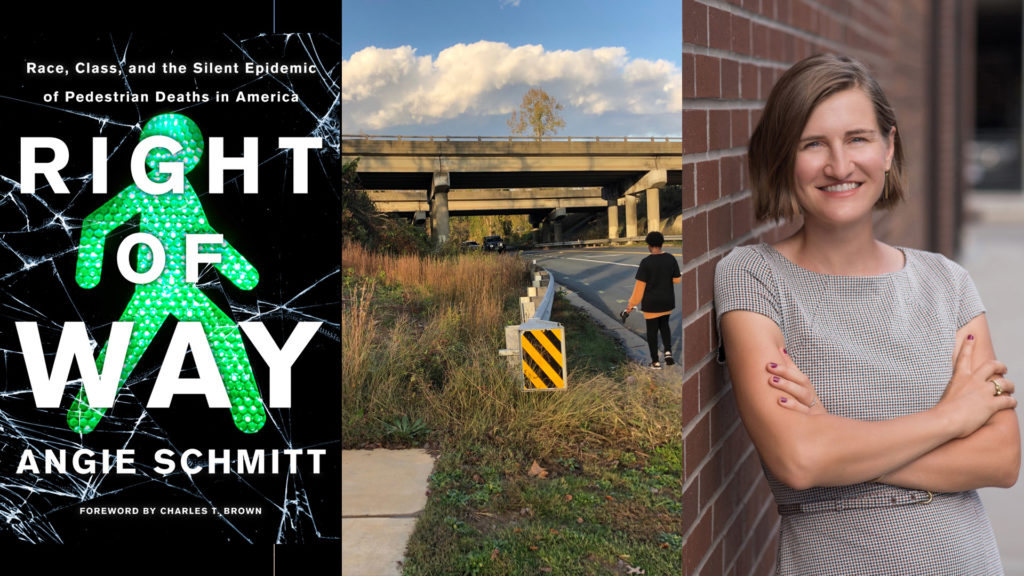
- This event has passed.
“Right of Way” Book Club & Discussion
February 18, 2021 @ 5:00 pm – 6:30 pm

The City of Charlottesville, Jefferson-Madison Regional Library, and Piedmont Environmental Council invite you to read and discuss the new book Right of Way: Race, Class, and the Silent Epidemic of Pedestrian Deaths in America by Angie Schmitt.
How it works:
- Sign up to let us know you’re interested.
- Get the book. You can either
- order a copy from Island Press (use the discount code SCMITT for 20% off),
- pick up a free copy of Right of Way from the Market Street branch of the Jefferson-Madison Regional Library (201 East Market Street, 10-4 Mon – Sat) while supplies last, or
- check out the book at Jefferson-Madison Regional Library.
- Join us for an online discussion on Thursday, February 18, 5-6:30 p.m. on Zoom. Registration required.
- Study / discussion questions are included below.
This event is free. Contact [email protected] or call 434-970-3720 for more information.
Study Questions
- Is it fair to deem the pedestrian crisis an epidemic? Why or why not?
- Angie says that our assumptions about who is getting injured and dying might be wrong. Does it matter? Does it suggest targeted approaches and solutions?
- What are some factors that Angie says make some people more likely to be injured or killed than others? She also outlines some geographic considerations. How do these overlap and where can those zones be found in our area?
- There are two women in the book who lose sons in car crashes: Amy Cohen and Raquel Nelson. Their experiences are very different. How do you think their race and social status impacted their treatment?
- Explain the significance of Virginia’s new statute decriminalizing jay-walking. What are the socioeconomic implications? Will it change pedestrian or driver behaviors? Will it save lives? What are reasonable next steps?
- Are bigger vehicles an irreversible trend? What role can we play as outdoors advocates and influencers in a marketplace where large vehicles have names like Outback, Denali or Tundra?
- Is Charlottesville ready for a Vision Zero Policy? The city has resolved to end homelessness; isn’t that an equally complicated and vexing issue? What about Albemarle?
- What are some Vision-Zero strategies that might work in our area?
- Angie cites the notion that “Cars are essential to the American Way of Life,” is a barrier to progress. But does it need to be? Are there ways to talk about safety for pedestrians that don’t diminish drivers’ access to opportunities?
- In our federal system it’s not always clear which level of government ought to fund local transportation. Where, in your opinion, ought that responsibility reside? What actions can you take to bring about change at that particular level?
- Throughout the book, Angie pushes against the prevalent idea that most traffic fatalities are caused by users (often pedestrians’) rather than the system. Do you think the advent of autonomous vehicles will prove her wrong or prescient?
- Is every preventable death an injustice? If so, why? If not, how do we decide?
- Is more enforcement a good idea? What modified approaches might better balance different kinds of justice?
- Do groups like Families for Safe Streets, Mothers Against Drunk Driving, Everytown for Gun Safety speak for all Americans or is their appeal limited to the Middle Class similar to, say, PTOs? Does that matter?
- Getting back to the question of epidemics and avoiding unnecessary deaths, what has COVID taught us, positive and negative, about strategies that are likely to win the public imagination?
Huge thanks to Charles Brown and Angie Schmitt, who contributed questions to this list.
You can watch Angie’s November 30 presentation here.
